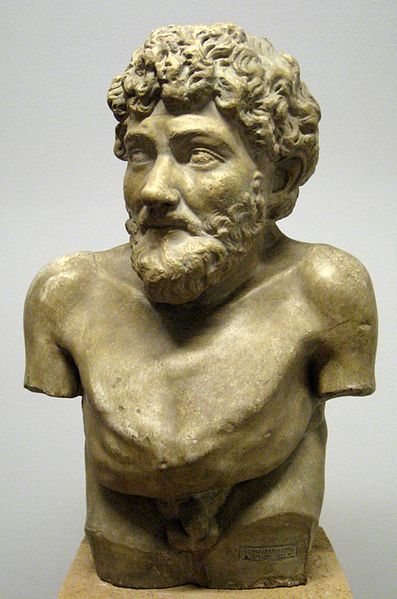Wide World of Quotes > Aesop Quotes
Aesop
Greek fabulist
(650? - 560 BC)

Aesop
|
Share this page:
Aesop (c. 6th century B.C.) was the author of Aesop's Fables. He was said to have been a slave in Samos (part of ancient Greece). Aesop's Fables are a collection of animal tales. Each tale ends with a moral. Some of Aesop's most famous tales included "The Fox and the Grapes", "The Hare and the Tortoise" and "The Ant and the Grasshopper". It is thrifty to prepare today for the wants of tomorrow. -- Aesop, "The Ant and the Grasshopper", in: Aesop's Fables People often grudge others what they cannot enjoy themselves. -- Aesop, "The Dog in the Manger", in: Aesop's Fables I am sure the grapes are sour. -- Aesop, "The Fox and the Grapes", in: Aesop's Fables Thinking to get at once all the gold the goose could give, he killed it and opened it only to find - nothing. -- Aesop, "The Goose with the Golden Eggs", in: Aesop's Fables Slow and steady wins the race. -- Aesop, "The Hare and the Tortoise", in: Aesop's Fables The gods help those that help themselves. -- Aesop, "Hercules and the Waggoner", in: Aesop's Fables No act of kindness, no matter how small, is ever wasted. -- Aesop, "The Lion and the Mouse", in: Aesop's Fables Do not count your chickens before they are hatched. -- Aesop, "The Milkmaid and her Pail", in: Aesop's Fables A crust eaten in peace is better than a banquet partaken in anxiety. -- Aesop, "The Town Mouse and the Country Mouse", in: Aesop's Fables  Aesop's Fables (Oxford World's
Classics) The fables of Aesop have become one of the most enduring traditions of European culture, ever since they were first written down nearly two millennia ago. Aesop was reputedly a tongue-tied slave who miraculously received the power of speech; from his legendary storytelling came the collections of prose and verse fables scattered throughout Greek and Roman literature. First published in English by Caxton in 1484, the fables and their morals continue to charm modern readers: who does not know the story of the tortoise and the hare, or the boy who cried wolf? This new translation is the first to represent all the main fable collections in ancient Latin and Greek, arranged according to the fables' contents and themes. It includes 600 fables, many of which come from sources never before translated into English. Aesop's Fables (Oxford World's
Classics) The fables of Aesop have become one of the most enduring traditions of European culture, ever since they were first written down nearly two millennia ago. Aesop was reputedly a tongue-tied slave who miraculously received the power of speech; from his legendary storytelling came the collections of prose and verse fables scattered throughout Greek and Roman literature. First published in English by Caxton in 1484, the fables and their morals continue to charm modern readers: who does not know the story of the tortoise and the hare, or the boy who cried wolf? This new translation is the first to represent all the main fable collections in ancient Latin and Greek, arranged according to the fables' contents and themes. It includes 600 fables, many of which come from sources never before translated into English. Share this page: |
The selection of the above quotes and the writing of the accompanying notes was performed by the author David Paul Wagner.
About Us • Contact Us • Privacy • Terms of Use
© 2005-23 Wide World of Quotes. All Rights Reserved.